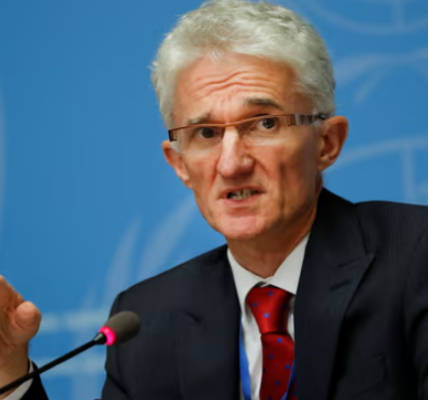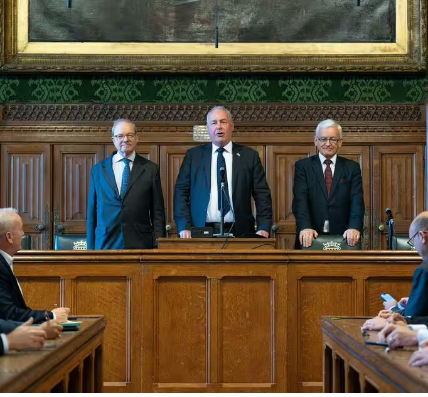Sources say Morgan McSweeney plans slew of changes as PM attempts to shore up top team after months of rows

Morgan McSweeney, who masterminded Labour’s election victory, was appointed chief of staff after Sue Gray was forced to resign. Photograph: Shutterstock
Keir Starmer’s new chief of staff, Morgan McSweeney, is preparing to make “radical changes” to the Downing Street operation as the prime minister attempts to shrug off internal rows and put a tumultuous period behind him.
No 10 sources said that “nothing was off the table” when it came to ensuring the machinery of government was fit for purpose, heralding a slew of changes that could reshape the Downing Street organisation.
This could include recasting different teams inside No 10, resolving the pay dispute with special advisers and further bolstering the political side of the operation with more appointments. McSweeney would also take a more data-led approach to decision-making, sources said.
“The day-to-day machinery of government doesn’t work properly. Morgan has a different view on how to do things. He’s nothing if not the agent of change,” said one senior source.
“He will have to be radical. Nothing is off the table. We’re expected to be running a powerful G7 economy yet sometimes it’s all quite small and analogue. There has to be a better way of doing things.”
Downing Street insiders played down the prospect of an imminent cabinet reshuffle despite reports that McSweeney could push for one, adding that he did not believe the government’s recent woes were the fault of ministers and wanted to “see what works first”.
There was trepidation among allies of some cabinet ministers who had been close to Sue Gray, the ousted former chief of staff, about their position longer term. However, Starmer is understood to believe that previous governments moved ministers around too frequently.
McSweeney, who masterminded Labour’s election victory, is expected to attend cabinet on Tuesday. He was appointed chief of staff by Starmer on Sunday as he moved to shore up his top team after months of rows and infighting, leading to the departure of Gray.
Gray was forced to resign less than a week before the government was due to mark 100 days in office, after becoming a lightning rod for criticism in a political storm at the heart of Downing Street.
Senior officials said that Starmer would now have a united No 10 team for the first time since taking power, meaning they could focus on delivering on the government’s promises, rather than on internal power struggles.
The prime minister’s official spokesperson said he was now “completely focused” on delivery. “He’s made the right changes to ensure that we have strengthened the No 10 operation to deliver the change the country voted for.”
But he appeared to accept that Gray’s departure meant Starmer recognised the internal problems in Downing Street. “I think it’s right to reflect on the first weeks and months in office to ensure that you do have the right structures in place going forward to deliver change for the country.”
Asked whether the prime minister viewed his first 100 days in office, which have been beset by rows and infighting, as a success, he responded: “It’s up to the public to determine what is success for them.”
The prime minister was first warned he needed to “get a grip” on his Downing Street operation by senior advisers some weeks ago, and has spent the intervening period drawing up a plan.
“When he acts, he acts decisively, but he won’t have made the decision without thinking through the implications,” one aide said. Senior officials believed that he would get just one opportunity for a reset, so had to get it right.
McSweeney’s early focus will be on major events including Starmer’s first summit of the nations and regions on Friday, a big investment summit on Monday and – a key milestone in the future direction of the government – the budget.
He will try to speedily resolve the dispute over special advisers’ pay, which pitched Gray against political aides across government, their furious response to finding out she was paid more than Starmer helping to hasten her departure.
Some cabinet ministers have responded nervously to McSweeney’s appointment because, despite his political skills, he has little experience of Whitehall. However, his allies said he was “alive to the gaps” and aware of the loss of Gray’s institutional knowledge.
The appointment of a new principal private secretary, Ninjeri Pandit, as well as the start of the process to replace the outgoing cabinet secretary, Simon Case, should, they believe, help bolster the civil service side of the operation.
Gray has been appointed the prime minister’s envoy to the nations and regions, a civil service post based in the Cabinet Office, her old department. It is unclear whether, and how much, she will be paid for her advisory role, although she is understood to have agreed a severance package.
John Healey, the defence secretary, denied that Gray leaving her post fewer than 100 days into the new administration meant the government was at crisis point. “No, I’d characterise this as a new government getting on with the job,” he said.
He added that “sadly, it’s nothing new” to see a senior No 10 aide become “a lightning rod for criticism”, echoing comments made by the party’s former deputy leader Harriet Harman, who said “missteps” and “clunkiness” were to be expected when a party first returned to office after a long period in opposition.
Senior Labour figures welcomed the changes, which they suggested were overdue. John McTernan, a former political director under Tony Blair, said No 10 had been “politically underpowered” with “no grip” on the narrative.
Blair’s former spin chief, Alastair Campbell, warned Starmer against taking “too many missteps” and allowing a “sense of vacuum” to develop.
The shadow Commons leader, Chris Philp, said: “What this shows us is that Keir Starmer’s government has collapsed into chaos after just 93 days. He can’t even run his own No 10 Downing Street operation, let alone run the country. This has all fallen apart a lot faster than I was expecting.”




